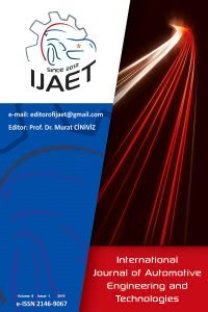Development of Test Methodology to Reveal Effects of Changes in Damping Capacity of Damper on ABS Braking Performance
Development of Test Methodology to Reveal Effects of Changes in Damping Capacity of Damper on ABS Braking Performance
___
- Bosch, R. (1999). Driving-Safety Systems. 2nd updated and expended edition. SAE, USA.
- Austin, L. and Morrey, D. (2000). Recent advances in antilock braking systems and Proceedings of the institution of mechanical engineers, Part D: J. Automobile Engineering, 222, 625-638.
- Garrick, J.F., Flick, M. and Garrott, W.R. (1999). Final Report: A Test Track Study of Lightweight ABS Performance over a Broad Range of Surfaces and Maneuvers. Transportation, NHTSA/NRD-22.
- Nigam, S. (1993). Modeling, Simulation and Response Analysis of Antilock Brake System. Ph.D. Dissertation, West Virginia University.
- Bera, T.K., Bhattacharya, K. and Samantaray, A.K. (2011). Evaluation of Antilock Braking System With an Integrated Model of Full Vehicle System Dynamics. Practice and Theory, 19, 2131-2150.
- Vaculín, O., Svoboda, J., Valásek, M. and Steinbauer, P. (2008). Influence of Deteriorated Suspension Components on ABS Dynamics (Supplement), 46, 969-97.
- Calvo, J.A., Diaz, V., San Roman, J.L. and Influence of Shock Absorber Wearing on International Journal of Automotive Technology, 9(4), 467-472. (2008). Vehicle Brake Performance.
- Lin, J.S. and Ting, W.E. 2007. Nonlinear control design of anti -lock braking systems with assistance of active suspension. IET Control Theory Applications, , 1(1), 343-348.
- Niemz, T. 2006. Reducing braking distance by control of semi-active suspension. Ph.D. Thesis, Technischen Universitat Darmstadt, Germany.
- Niemz, T., Reul, M. and Winner, H. 2007. A New Slip Controller to Reduce Braking Distance by Means of Active Shock Absorbers. 14th Asia Pacific Automotive Engineering Conference, Society of Automotive Engineers.
- Reul, M. and Winner, H. 2009. Enhanced Braking Performance by Integrated ABS and Semi -Active Damping Control. Proceedings of ESV 2009, Stuttgart.
- Adams, D.E., Janas, J., Goyal S., Braun,C., Seeniraj, G. and Bono, R.W. 2006. Lab Lessons Learned--Part 2: Road Quality Determınatıon Using Vehicle Data. Experimental Techniques, 30 (1), 61 -66.
- Dixon, J.C. 2007. The Shock Absorber Handbook. 2nd Edition. John Wiley & Sons, England.
- Hunt, B., Lipsman, R., Rosenberg, K., Coombes, K., Osborn, J. and Stuck, G.A. 2001. Guide to MATLAB for beginners and experienced users. Cambridge University Press. Cambridge, UK.
- Yayın Aralığı: 4
- Başlangıç: 2012
- Yayıncı: Murat CİNİVİZ
Ali KAHRAMAN, Murat CİNİVİZ, İlker ÖRS, Hidayet OĞUZ
Yahya Erkan AKANSU, Mustafa SARIOĞLU, Mehmet SEYHAN
Murat KARABEKTAS, Can HASİMOGLU, Ahmet MURCAK, Gokhan ERGEN
Drag Force Estimation of a Truck Trailer Model Using Artificial Neural Network
Mehmet SEYHAN, Mustafa SARIOĞLU, Yahya Erkan AKANSUB
Ahmet MUCAK, Murat KARABEKTAS, Can HASİMOGLU, Gokhan ERGEN
The Effect on Performance and Exhaust Emissions of Adding Cotton Oil Methyl Ester to Diesel Fuel
